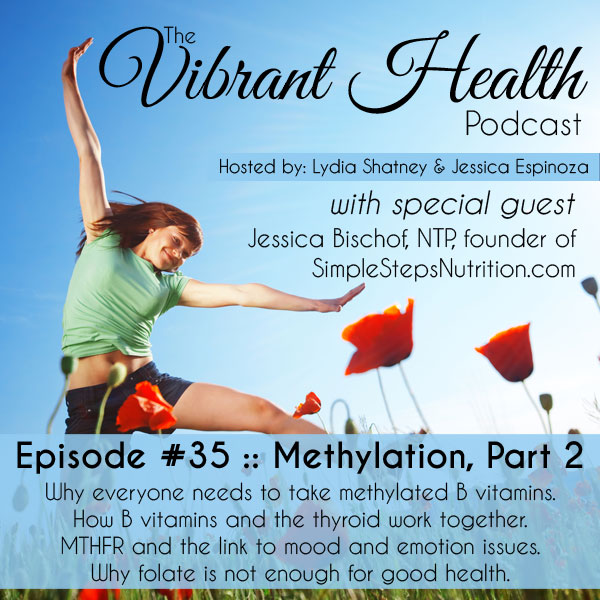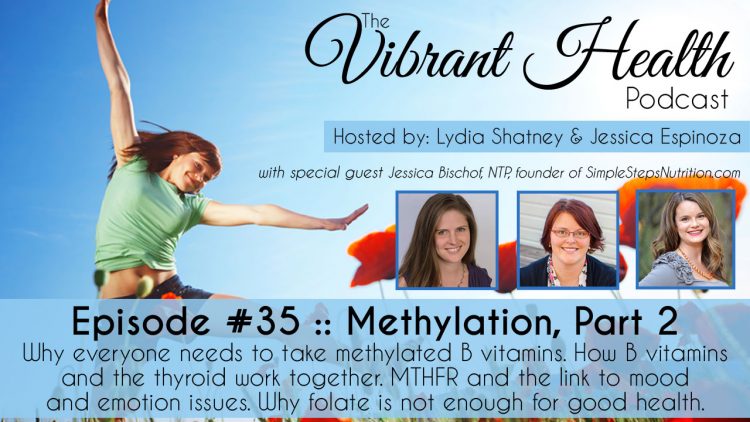FTC Disclosure: Delicious Obsessions may receive comissions from purchases made through links in this article. As an Amazon Associate I earn from qualifying purchases.Read our full terms and conditions here.

Today, Lydia and I are joined by our friend and colleague, Jessica Bischof. You may remember Jessica from episode 23 where she spoke about how she has been using methylation research to help her own clients. That episode is the perfect primer to today’s follow-up show, so if you haven’t listened to it yet, we highly recommend it.
Today, we will be diving into a little deeper nitty gritty of methylation and how it can impact your life. Methylation is a really complicated topic and it’s hard to figure it out without some help from an expert. Thankfully Jessica is happy to share her knowledge today and we’re super excited to dive in!
Missed previous episodes? You can find them all here.
Links From This Week’s Episode:
- MTHFR.net – Your Expert Resource on MTHFR Gene Mutations
- 23andMe.com – Get your genetic testing here
- Learn More About Jessica Bischof and Her Services
- Health Assessment with Lydia
- Hair Analysis with Lydia
- Information about HTMA and Minerals
- How to Create a Game Plan to Keep Your Whole Family Healthy
Listen to The Vibrant Health Podcast :: Episode 35
Read The Vibrant Health Podcast Show Notes :: Episode 35
Methylation, Part 2 Show Notes
Make sure you check out the Links from the Episode for lots more information on today’s topic.
We are very excited to have Jessica Bischof back on the show today to talk more about methylation.
You may remember Jessica joining us on episode #23 where we discussed the basics of methylation. If you haven’t listened to that episode yet, we encourage you to do so as it gives some background into our more in-depth discussion today.
Jessica is a nutritional therapy consultant with a functional nutrition focus. She has found that addressing methylation issues with her clients can help take their healing to a whole new level once the foundation of good nutrition and lifestyle has been laid.
Methylation Overview and Why Folate is Not Enough
We addressed the basics in episode 23, but the most common gene mutation that people hear about is MTHFR.
One of the primary problems that a MTHFR mutation can have on the body is the prevention of the body from turning folate in our food into the active form that the body needs for biochemical reactions.
Folate deficiency is the reason that so many food products are fortified or enriched with folic acid, but this form is a synthetic and shelf-stable form that is not easy for many people to convert within the body.
We can have deficiencies by not getting enough through our diet, as well as a deficiency that is due to our body’s inability to convert what we eat into an active form. When you have methylation issues, folic acid can be detrimental to our health because it cannot be properly used by the body and can even lead to damage within the body.
Two places to avoid folic acid are processed foods (breads, juices, tortillas, crackers, etc.) and supplements. A good rule of thumb is to avoid folic acid whenever possible, though people’s reactions to it may vary to some degree.
Why Everyone Needs to be Taking Methylated Vitamins
When you are looking at supplements, you should always try to look for methylated forms. If it says folic acid, don’t buy it. But, it does go deeper than that. The labels can often just say “folate” and it is in truth “folic acid” because “folate” is kind of a catch-all term that can be used for all forms of this B vitamin. Just because a label says “folate” does not mean you are not actually getting “folic acid.”
A couple examples of safe folate forms:
- Calcium-folinate is a form that is not the active form, but it is also not toxic to people with MTHFR defects.
- 5-MTHF is an active form of folate that will be safe for people with MTHFR defects.
It’s more than just folate and we should also consider taking vitamins B2, B6, and B12 in active forms. They should all say 5-phosphate at the end. It’s important to also know that there are numerous cofactors that are required in order to make the B vitamins work properly in our body.
When recommending a supplement, Jessica strives to recommend brands that have active forms AND all the cofactors that are required to make those vitamins work properly in the body.
A quick and easy way to check your supplements for quality is to read the label and look for folic acid and cyanocobalamin. If the supplement has either of those in it, put it down and don’t purchase it. These are not safe forms and should be avoided.
Can We Get Enough In Our Food?
This is a vague question in that everyone’s needs are going to vary depending on their health status. We can always overdo it with specific nutrients, but we can also come up short as well.
When it comes to getting enough from our food, Jessica does not feel that we can. Our food quality is simply minerally deficient and that has even been proven by the FDA. The food quality has declined substantially over the last 50 years.
Fruits and veggies are going to be a great source of all your nutrition. Raw forms are the best way to get the B vitamins as they are heat fragile and will be decreased by cooking. B vitamins are also water soluble and will be excreted via the urine if not used within the body.
How B Vitamins and the Thyroid Work Together
Thyroid problems are so common today and B vitamins can really correlate to thyroid health. This is one of Jessica’s favorite areas to work in because it is so fascinating.
MTHFR is an enzyme that requires a cofactor FAD which is the active form of riboflavin (B2). We have to have FAD to make MTHFR work. What does the body use to convert riboflavin from our food to FAD? It needs ATP (energy produced by the mitochondria). Research has also shown that the body needs T4 (thyroxine – the inactive form of thyroid hormone) to also make that conversion. People who are low in T4 may have impaired ability to convert riboflavin to FAD, therefore impacting methylation issues.
In Jessica’s opinion, this is another reason as to why it is best to take the active form of B vitamins AND also make sure that your thyroid levels are optimal. If you are hypothyroid or low thyroid hormone, it will reduce your body’s ability to convert B2 into the active form and you need the active form for your whole methylation cycle to work.
MTHFR and Mood / Emotion Issues
We know that the methylation cycle has a direct role in our neurotransmitter system, which is what helps keep our moods and emotions stable.
Keeping appropriate levels of neurotransmitters is going to be reliant on the proper use of our B vitamins in our body, which in turn is affected by our methylation issues that we may have based on our genetics.
This is a perfect example of how everything in the body is really impacted by multiple systems in our body and when one system gets impaired, it creates a cascade of issues within all other systems.
It all comes back to basic nutrition — the fuel that makes everything run is the nutrients we get from our food and our supplements.
Main Takeaways
Even if you do not yet have genetic data, the main takeaway from this is to pay attention to your supplements and avoid the forms mentioned above. Everyone can benefit from taking the active forms of B vitamins, regardless of what your genetic status is.
When/if you get ready to dive deeper, you can get your genetic profile run through 23andMe.com which is a reputable site and the one used most frequently for things like this. You will need to work with a practitioner when you get the results back because it is so complex and difficult for the average person to understand.

